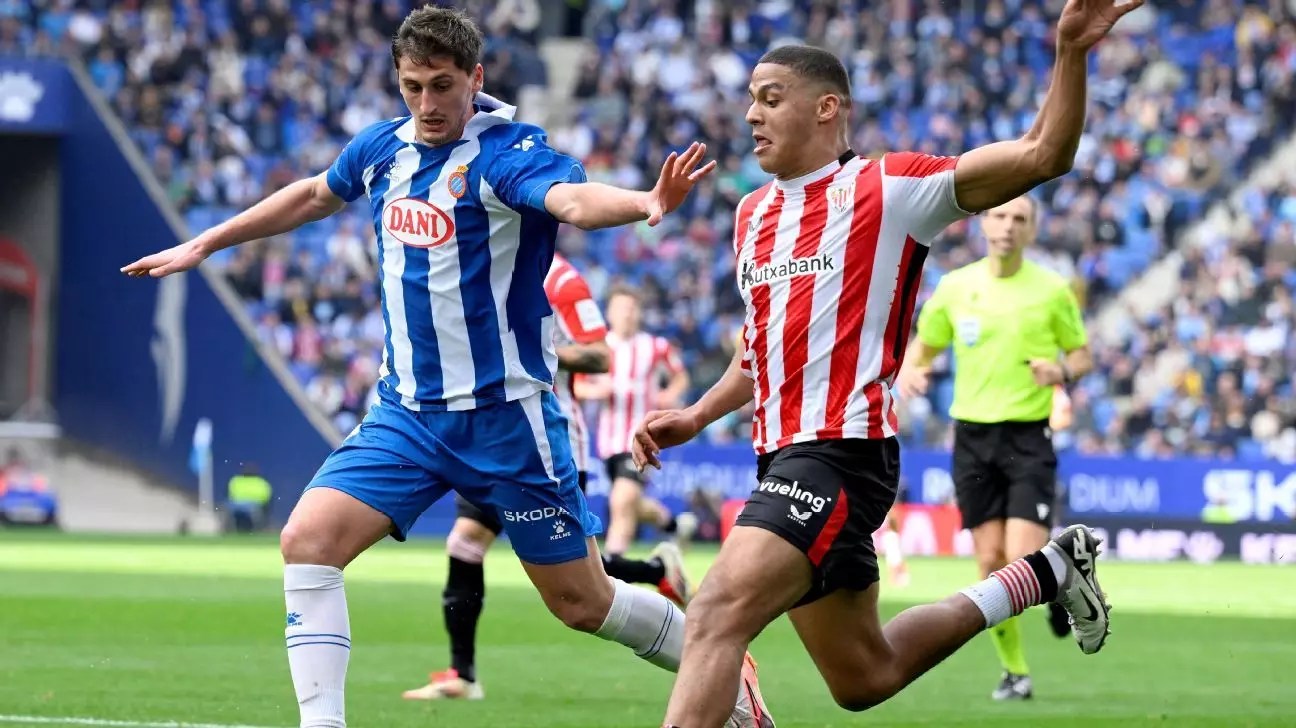The world of football has long been marred by incidents of racism, reflecting deeper societal issues that plague many communities. A recent match in LaLiga between Espanyol and Athletic Club epitomized this ongoing struggle. The game, intended to be a showcase of sporting talent, instead became a platform for the alarming re-emergence of racist chants directed at Athletic’s forward, Maroan Sannadi. This incident is not just a reflection of isolated fan behavior but serves as a grim reminder of the systemic racism that persists in the sport.
During the match, in the 17th minute, the atmosphere shifted dramatically. Referee Guillermo Cuadra Fernández halted the game as reports emerged that Sannadi was subjected to racial abuse from a section of Espanyol’s supporters. This prompted the activation of LaLiga’s anti-racism protocol, which aims to address and mitigate such reprehensible behavior. The stadium’s big screens broadcast a message warning fans that continued abuse could lead to the game being suspended or abandoned.
Athletic Club forward Iñaki Williams, who brought the referee’s attention to the incident, initially faced backlash from fans, suggesting that an atmosphere of fear and intimidation had taken hold. However, Williams clarified that it was Sannadi who was targeted. This unfortunate scenario underscores the reality that racism in football not only affects those directly targeted but also creates a toxic environment for all players and fans alike.
Post-match interviews revealed a collective outrage among players regarding the racism that infiltrated their sport. Williams emphasized the emotional toll these repeated incidents take on players, stating, “You come to football to enjoy yourself,” thereby highlighting the intrinsic joy that the sport should bring. It is striking to note that this was not the first time Williams had experienced racism at the RCDE Stadium, reflecting an unsettling pattern.
Athletic’s coach, Ernesto Valverde, echoed these sentiments, stating that the identity of the targeted player was immaterial; racism in any form is unacceptable. This unity among players, coaches, and staff speaks volumes about the collective call for action within the sport to combat racism effectively.
Espanyol’s Stance and Broader Implications
Espanyol issued a strong condemnation of the racism displayed by a minority of their supporters, demonstrating an understanding of the issue that goes beyond mere words. However, the challenge remains: genuine change requires not just condemnation but a proactive approach to ensure accountability and a culture of inclusiveness in football. The club’s previous tracking of racially abusive fans shows a commitment to addressing these issues, but the frequency of such incidents calls for a deeper examination of the club’s community engagement strategies.
Meanwhile, LaLiga has made strides in combating this issue, with concrete actions taken against individuals found guilty of racial abuse. The jailing of Valencia fans for abusing Vinícius Júnior marks a pivotal moment in Spanish football; however, while legal action is an essential step, it must be complemented by educational initiatives aimed at fostering respect among fans.
A Continuing Challenge
The ongoing struggle against racism in football is deeply troubling, as evidenced by consistent reports stemming from various clubs across Spain. The incidents involving Vinícius Júnior and others underscore the urgent need for comprehensive strategies that involve all stakeholders in football, including governing bodies, clubs, players, and supporters.
Anti-racism campaigns must extend beyond mere responses to incidents. Effective education initiatives aimed at creating awareness and encouraging respectful behavior among fans could sow the seeds of long-term change. Football has the power to unite communities, yet it can also be a stage for hatred if unchecked.
The draw between Espanyol and Athletic Club serves as a stark reminder that the battle against racism in football is far from over. While the actions taken by the referee and the responses from players indicate progress, much work remains to be done. Football must evolve into a sport that champions diversity, inclusivity, and respect for all its players, regardless of their background. Without concerted efforts to eradicate racism, the beautiful game risks being tainted by the ugliness of bigotry.


Leave a Reply